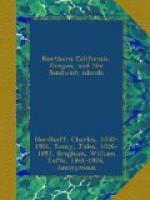[Illustration: CHAIN OF EXTINCT VOLCANOES NEAR KOLOA, ISLAND OF KAUAI.]
It is one of the embarrassing incidents of travel on these Islands that there are no hotels or Inns outside of Honolulu and Hilo. Whether he will or no the traveler must accept the hospitality of the residents, and this is so general and so boundless that it would impose a burdensome obligation, were it not offered in such a kindly and graceful way as to beguile you into the belief that you are conferring as well as receiving a favor. Nor is the foreigner alone generous; for the native too, if you come with a letter from his friend at a distance, places himself and all he has at your service. When we had reached our friend’s house, I asked my conductor, the policeman, what I should pay him for the use of three horses and his own services. He replied that he was but too happy to have been of use to me, as I was the friend of his friend. I managed to force upon him a proper reward for his attention, but I am persuaded that he would have been content without.
Kauai is probably the oldest of the Hawaiian group; according to the geologists it was the first thrown up; the bottom of the ocean began to crack, up there to the north-west, and the rent extended gradually in the south-easterly direction necessary to produce the other islands. It would seem that Kauai must be a good deal older than Hawaii; for, whereas the latter is covered with undecayed lava and has two active volcanoes, the former has a rich and deep covering of soil, and, except in a few places, there are no very plain or conspicuous cones or craters. Of course the whole island bears the clearest traces of its volcanic origin; and near Koloa there are three small craters in a very good state of preservation.
Having thus more soil than the other islands, Kauai has also more grass; being older, not only are its valleys somewhat richer, but its mountains are also more picturesque than those of Maui and Hawaii, as also they are much lower. The roads are excellent for horsemen, and for the most part practicable for carriages, of which, however, there are none to be hired.
The best way to see the island is to land, as we did, at Waimea; ride to a singular spot called the “barking sands”—a huge sand-hill, gliding down which you hear a dull rumble like distant thunder, probably the result of electricity. On the way you meet with a mirage, remarkable for this that it is a constant phenomenon—that is to say, it is to be seen daily at certain hours, and is the apparition of a great lake, having sometimes high waves which seem to submerge the cattle which stand about, apparently, in the water.




